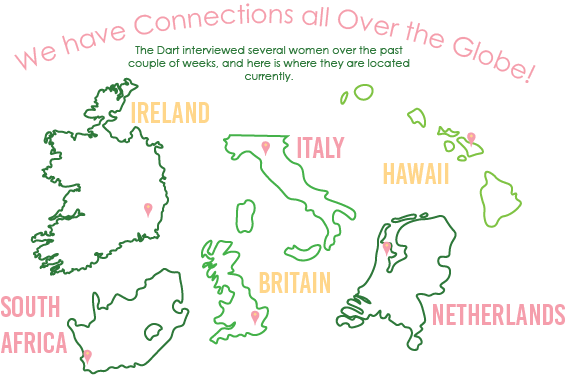Study reveals that American women are unhappier than ever, possibly due to extra responsibility | by Micah Wilkins
In 2006, 4,6000 women were surveyed and asked “Taken all together, how would you say things are these days, would you say that they are very happy, pretty happy or not too happy?” More women than men responded “not too happy” and more men responded “very happy.”
According to this recent study, American women’s happiness and satisfaction has declined since the 1970s.  While no simple theory has explained this recent decrease, some have speculated as to why women are less happy.  Other women, however, totally disregard the study.
“There appears to be increasing ambition of young women beyond the domestic sphere,” claims the study, “The Paradox of Declining Female Happiness,” conducted by Betsey Stevenson and Justin Wolfers, professors at the University of Pennsylvania.  “These data arguably suggest that women’s life satisfaction may have become more complicated as the women have increased the number of domains in which they wish to succeed.”
While “The Paradox of Declining Female Happiness” found women to be unhappier than men, it also found that young women, specifically girls in the twelfth grade, are unhappier than older women.
Adolescent Issues
Dr. Kym Bennett, Professor of Social Psychology at University of Missouri, Kansas City speculates that young women are unhappy in some areas because they tend to compare themselves to others.
“For adolescent females, social comparisons are very important,” Bennett said.  “During adolescence, we are forming our identities.  With the importance of the mass media in today’s culture, it can be argued that young girls have unreasonable expectations about body image, fashion and wealth.”
Now, there are more women in the workforce and in the college and university setting, according to a study by Time Magazine and the Rockefeller Foundation. Due to this societal shift, women not only compare themselves to female peers, but also to male peers in the work or school environments.  This may lead women to feel inferior to their male counterparts, ‘Declining Female Happiness’ claims.
‘The changes brought about through the women’s movement may have decreased women’s happiness,’ the study said.  “The increased opportunity to succeed in many dimensions may have led to an increased likelihood of believing that one’s life is not measuring up.”
Senior Kelsey Wendland agrees that young women today have high expectations for themselves when it comes to things like body image and schoolwork.
“A couple of my friends I wouldn’t say are unhappy, but they’re dissatisfied with where they are,” Wendland said.  “Women have issues with body image and self-confidence, so they’re really hard on themselves and they set their standards really high.”
According to the study, twelfth grade girls are dissatisfied with friends, the way they spend their time and the amount of stress they feel that they’re under.
“The common thread appears to be that twelfth grade girls increasingly find themselves to be under time pressure, with absolute and relative declines in reported satisfaction with ‘time for doing the things you want,’ ‘the way you spend your leisure time,’ and ‘the amount of fun you are having,” Â Stevenson and Wolfers said. “Interestingly, there is also a substantial decline in the proportion of these young women reporting satisfaction with ‘friends and people you spend time with.'”
When In Doubt
While some women have taken the study’s results into serious consideration, others have disregarded the results as inaccurate. According to Ms. Brenda Bethman, the director of the Women’s Center at UMKC, “Declining Female Happiness” is flawed and misleading, as the study reveals that “by 2006, women were one percentage more likely to report they were not too happy.”
“I’m not totally convinced that the study’s right or that it matters that much,” Bethman said.  “A one point difference isn’t that big.”
Bethman also thinks the survey is inaccurate because suicide rates for women have declined, while African-American women are becoming happier.  The study is also flawed in that it is difficult to gauge emotions in a survey says Bethman.
“Happiness studies in general don’t often work,” Bethman said.
Wendland also agrees that women may have answered the survey differently than men because women tend to be more in tune with their emotions.
“Women’s tendency to involve their emotions more makes them more vulnerable because men, who also have their own problems, don’t take it to heart as often,” Wendland said.
Like Wendland and Bethman, Ms. Judith Warner, a columnist for The New York Times, thinks that happiness cannot be sufficiently and accurately measured.
“I tend to have a problem with studies that measure nebulous emotional states and then compare them back to other nebulous states experienced at different moments in time,” Warner said in her regular column, Domestic Disturbances.  “Happiness, after all, is hard to quantify; you can’t measure it in a blood test, or map it in a mathematical equation corresponding to patterns of neuronal activity in the brain.”
The study itself does admit to some leeway, however, stating that subjective wellbeing is difficult to comprehend, while reasons for the decline are hard to hypothesize.
“[The] aspect of subjective wellbeing makes understanding what is behind declining female happiness a challenging task,” the study says.
What is important to recognize however, is that if women are indeed unhappy, then society can do a lot to change this, according to Wendland.
“I think it’s good for women to know that women are unhappy because we have the potential and the solidarity to come together and help each other,” Wendland said.  “It makes others more aware, and as for me, it makes me want to be more conscious of that and look out for others.”
- When asked “How would you say things are these days?” 17.8 percent of seniors answered “Not too happy,”  while 4.5 percent of freshmen answered “Not too happy.”
- 30.4 percent of seniors are not satisfied when it comes to their friends, how they spend their leisure time, their performance in school, and themselves as a whole.
The Dart polled 100 students randomly,  and asked students “How would you say things are these days, very happy, pretty happy or not too happy? ” The following are the results:
Freshmen:
Very Happy:  (40.9%)   Pretty Happy:  (54.5%)   Not Too Happy:  (4.5%)
Sophomores:
Very Happy:  (26.3%)   Pretty Happy:  (63.2%)   Not Too Happy:  (10.5%)
Juniors:
Very Happy:  (9.1%)   Pretty Happy:  (68.2%)  Not Too Happy:  (18.2%)
Seniors:
Very Happy:  (21.4%)   Pretty Happy:  (60.7%)  Not Too Happy:  (17.8%)
By the Numbers
Today, 57% of college students in the US are women
55% of women agree that in households where both partners have jobs, women take on more responsibilities for the home and family then their male partners do
69% of women say that they are the primarily responsible for taking care of children
Kansas City is ranked 84 out of 100 for healthiest places for women. #1 is Burlington, VT.
52% of women still bear the primary responsibility for taking care of sick or elderly parents (Time Magazine)
40% of women feel stressed “frequently,” while 39% are stressed “sometimes” (Time Magazine)
Women make up 49.8% of America’s workforce (Time Magazine)
Women make $.77 for every $1 men make
84% of women agree that businesses have not done enough to address the needs of modern families
40% of women say they are the primary breadwinner in their household
sources: Time Magazine, Self Magazine






